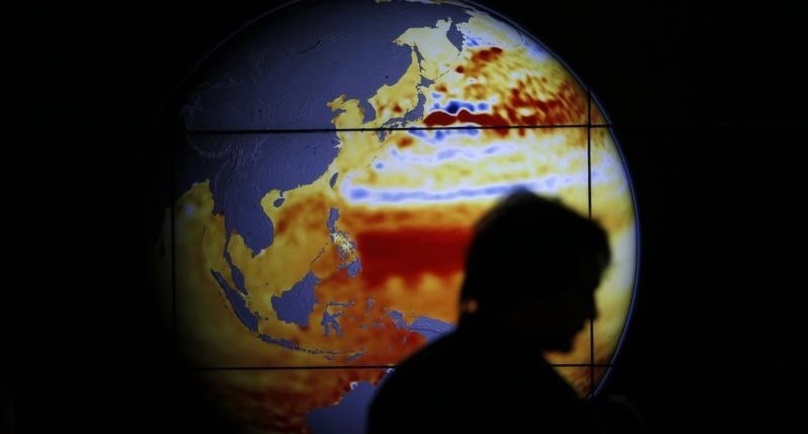Image: A woman walks past a map showing the elevation of the sea in the last 22 years during the World Climate Change Conference 2015 (COP21) at Le Bourget, near Paris, France, December 11, 2015. REUTERS/Stephane Mahe
By Nina Chestney and Alister Doyle
PARIS (Reuters) – A deal to slow climate change being thrashed out in Paris fails to map out steep enough cuts in carbon dioxide emissions to limit global warming to the target of at least “well below” 2 degrees Celsius (3.6 Fahrenheit), scientists said on Friday.
Negotiations on the draft agreement to curb greenhouse gas emissions, blamed for warming the planet and disrupting the climate, were extended by a day on Friday to Saturday to try to overcome stubborn divisions among the 195 countries taking part.
The draft text, released on Thursday and subject to revision, also proposes that emissions peak “as soon as possible”, with rapid cuts thereafter towards achieving “greenhouse gas emissions neutrality in the second half of the century”.
Neutrality refers to all greenhouse gases, not just carbon dioxide, and means net zero man-made emissions from all sectors.
Overall emissions would need to be reduced to as close to zero as possible and any remaining would have to be soaked up by forests and soils or buried underground by costly technology such as carbon capture and storage.
Scientists said the targets in the draft were too lax to achieve the goal of limiting global temperature rises above pre-industrial times to “well below 2C”, while pursuing efforts to limit the temperature increase to 1.5C (2.7F).
The rise in average global temperatures above pre-industrial times will exceed 1C this year, Britain’s Met Office has said.
‘WISHFUL THINKING’
More than 100 developing nations favor the 1.5C goal, saying higher temperature rises will bring more floods, droughts, decertification and sea level rise that could swamp low-lying islands from the Pacific to the Caribbean.
“This is wishful thinking. You might call it pie in the sky,” Hans Joachim Schellnhuber, head of the Potsdam Institute for Climate Impact Research, told Reuters.
He said emissions neutrality would have to be reached by 2050 to achieve the 1.5C goal, yet the text was too vague by talking about the second half of the century – up to 2099.
To meet a 2C limit, global emissions would have to peak by 2020 with net zero emissions of carbon dioxide by 2070, according to the U.N. panel of climate scientists.
Current national emissions cut plans put the planet on a far higher path, unless the world could abruptly shift to “negative emissions”, such as soaking up greenhouse gases from nature after 2030 with new technologies, Schellnhuber said.
So far, more than 180 nations have put forward plans to cut emissions but they put the world on a path to warming anywhere from 2.7C to 3.7C, according to scientific studies.
Scientists also said the language was weaker than in previous drafts.
“(This) has been replaced by rather vague formulations,” said Stefen Kalbekken, from the Center for International Climate and Environmental Research in Oslo.
Meeting a 1.5C limit would require higher energy prices to spur investment in cleaner energy sources, bioenergy and carbon capture and storage (CCS) technology, which captures carbon dioxide and stores it underground.
“It will need the development of a capacity for disposing of CO2 on a reasonably large scale, either captured from the air or from emissions from fossil fuels that countries or companies simply cannot bring themselves to leave in the ground,” said Myles Allen, professor of geosystem science at the University of Oxford.
CCS technology is still small scale and very costly. There are currently 15 projects in operation worldwide.
The International Energy Agency has said that by 2040, four billion tonnes of carbon dioxide emissions must be captured to keep global warming at bay, which is 100 times more than the total CCS projects expected to be online in the next 18 months.
(Editing by Janet Lawrence)
Copyright 2015 Thomson Reuters. Click for Restrictions.


